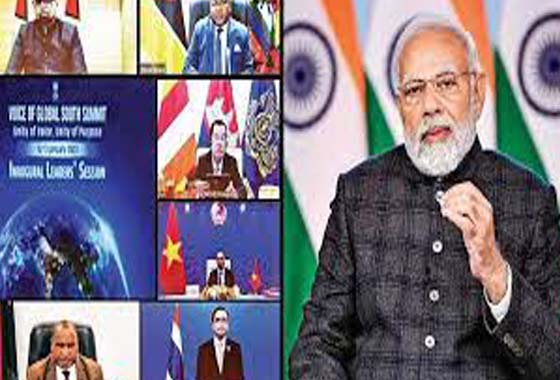
Our aim is to amplify the Voice of the Global South: PM Modi
New Delhi: It is natural that our aim is to amplify the Voice of the Global South, said Prime Minister Narendra Modi. In his virtual address at the first Voice of Global South Summit virtually on Thursday he said that this summit is a new initiative of the Government.
Leaders of Bangladesh, Cambodia, Guyana, Mozambique, Mongolia, Papua New Guinea, Senegal, Thailand, Uzbekistan and Vietnam were attended the summit. We at the Global South have the largest stakes in the future, three fourth of humanity lives in our countries, we should also have an equivalent voice, he said. The Indian leadership has emphasized that it will act as the representative of the Global South during its G20 Presidency.
Modi said that most of the global challenges have not been created by the Global South, but they affect these nations more. We have seen this in the impacts of the Covid-19 pandemic, climate change, terrorism and the Ukraine conflict. We supplied medicines and vaccines to over 100 countries during the pandemic as India has always stood for a greater role for developing countries in determining our common future, he added.
PM emphasized on the need for the Global South to be included in the global financial and political governance. We believe the path to realising ‘oneness’ is through human centric development. People of the Global South should no longer be excluded from the fruits of development. Together, we must attempt to redesign global political and financial governance, he said.
Modi proposed a new global agenda based on respond, recognise, respect and reform to re-energise the world. Respond to the proud needs of the Global South by framing an inclusive and balanced international agenda, recognise that the principle of common but differentiated responsibilities applies to all global challenges, respect the sovereignty of all nations, rule of law and peaceful resolution of differences and disputes, and reform international institutions, including the UN, to make them more relevant, he said.
The world is in a state of crisis after turning the page on another difficult year that saw war, conflict, terrorism and geo-political tensions, rising food, fertilizer and fuel prices, climate change-driven natural disasters and the persisting economic fallout of the Covid-19 pandemic, he said. It is difficult to predict how long this state of instability will last, he added.